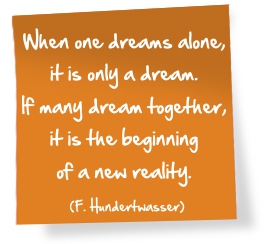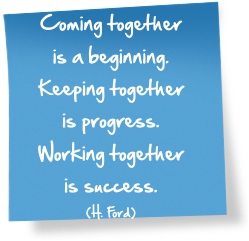

What justifies the entrepreneurial investment of your organization or your team?Why are you/your team their budget, including staff costs worth it? What do you/ does your team with which entrepreneurial and economic importance – what no other can do in the company? With the clarity of the answers to these questions, it is the mission and the common goals of teams and communities set to sharpen focus on concrete issues for the current/up-coming year and to clarify roles and responsibilities and the HOW of cooperation, including communication and further training of teams and individuals.
The picture above describes the steps involved in the strategy and team development:
1. Vision, mission, values: How is our target image? Where do we want to be in two to five years? What do we strive for to have achieved by then? How do we want to be seen by others? What values, attitudes and perceptions are important to us?
2. Strategy, objectives & roadmap: Where do we stand now (status)? What initiatives and actions are critical to achieve the target? How do we know that we are on the right path (leading and lagging indicators)?
3. Organizational control: How do we control? What processes, standards and Key Performance Indicators (KPI’s =) are binding on us as a team? Who takes on which role and responsibili-ties? Which interfaces need to be clarified? Who monitors and reports achievement of objec-tives and target deviations (“unvarnished”)?
4. Communication and coordination: How does the alignment work? How can we provide a uni-form, effective and transparent communication? Who needs to inform pro-actively? What are the “rules” of our cooperation?
5. Skills and team development: What skills are required to meet the team’s goals in the future? What qualifications are available, what is it to build up /develop? Are all skills used in a team goal-oriented manner and is there sufficient transparency about the required skills and ambi-tion level?
Professional workshop facilitation creates a framework in which all stakeholders can involve effectively and solute topics and conflicts in a solution-oriented and efficient manner. As facilitators, we support you with a clear structure and diverse methods to achieve maximum goals, outcomes and liabilities.
No matter how structural and factual the issues are – it is always about people to implement. Thus team development process, workflow optimization and relationship development happens at the same time and it takes foremost processes of clarification of expectations and the use of different skills / capabilities to enhance the overall results in terms of corporate goals.
Processes of change, mergers, acquisitions, new departments/organizational structure and/or work flows, virtual teams, new processes: in all of named change topics the team needs to define and align roles and responsibilities (Who is responsible for what results?), set up communication and information structures (who must be informed as to when, how?) and clarify the ways of communication. Whether e.g. in the sales organization (coordination between field organization, Key Account and Category Management), in Human Resources (personnel selection process, on-boarding programs) or in Quality Management (troubleshooting, error circle) at all it comes to a detailed analysis and definition of the processes with all internal and external interfaces. And especially for those teams, where responsibilities are not clearly defined, plays the “team action” and the team development a central role.
The company’s management and decision-makers need awareness of the process of team developments and the team needs control points within this process. For this reason, we recommend at least a 3-step approach: 1. Preliminary Talk (with respective team leader), 2. Team Development I (Duration: 1,0 – 1,5 days) and subsequent team development II (3-6 months later , from 0,5 to 1,0 day). This set up offers time to cope with upcoming changes and conflicts, but also in time to accompany the development and achievements. Furthermore it gives space for additional, individual and targeted other initiatives (like live coaching, e.g. supervision of a team meeting) to accelerate started development processes. Workshop experienced managers who want to take over the moderation themselves we encourage to do so and offer to support in the preparation (design, content and methodological structuring) and planning of the follow-up measures.
Possible requirements:
1. Strategy/corporate objectives/Balanced Scorecard/core competencies
2. Interfaces/alignment of processes (including personnel selection process, alignment of marketing and sales, production and quality, etc.)
3. Changes in strategic focus, team and resources allocation and new team set ups (e.g. as a consequence of restructuring, merger, new management, etc.)
4. Team collaboration (e.g. development of team values and team “rules”, conflict management, working with the five dysfunctions of a team)
5. Virtual teams and successful working in matrix structures
6. Project kick-off

Benefits (among others):
Clarified focus on team goals and ambition level, increased productivity through reduced friction loss and reduced number of double or not effec-tive work; Increase of relevant communication and information flow; re-duced meeting times, increased the team’s commitment and engagement, increased number of completed projects in target (time/budget/ quality) faster implementation of vision and strategy and more commitment to the effective implementation
Target group:
Organizational and functional units/project groups/teams (across all levels)
Topics/goals:
- Defining vision, mission, values
- Derived strategy, objectives and roadmap
- Self-image/external image/position in the company
- Ambitions-level, performance-, quality- and service standards
- Result orientation/goals: Team goals, individual goals/objectives of individual projects, connected to company’s overall strategy and goals
- Specify organization, resource allocation and control
- Clarify roles and responsibilities in connection with the clarification of expectations, objectives and resource conflicts
- Optimization of work processes (interface/process optimization/tuning)
- Communication and coordination processes (efficient meeting and feedback culture)
- Team development and team rules

